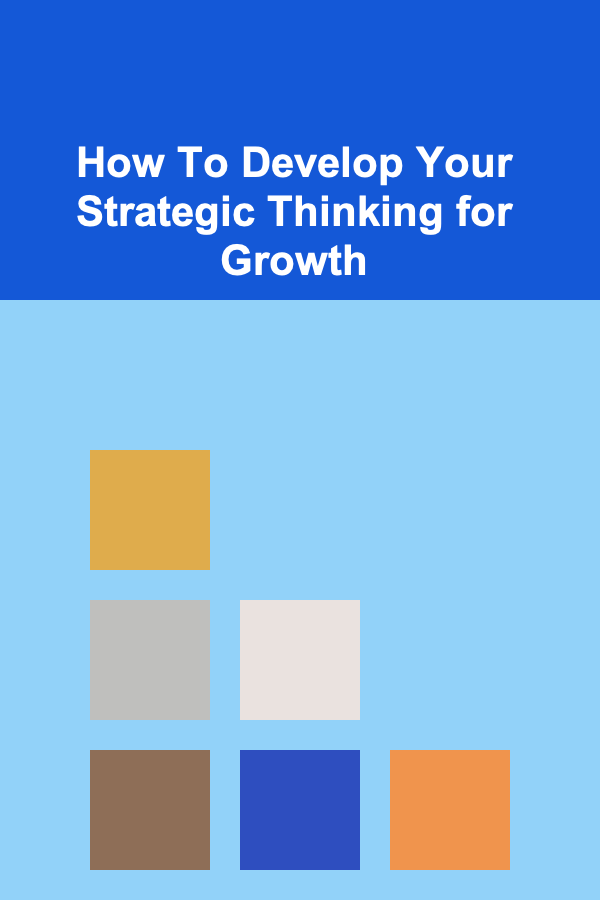
How To Develop Your Strategic Thinking for Growth
ebook include PDF & Audio bundle (Micro Guide)
$12.99$7.99
Limited Time Offer! Order within the next:

Strategic thinking is one of the most vital skills in personal and professional growth. Whether you're an entrepreneur, a manager, or an individual looking to elevate your career, honing your strategic thinking can pave the way to success. However, developing this skill requires understanding its core concepts, applying deliberate practices, and continuously adapting to new challenges. In this article, we'll explore how to foster strategic thinking to drive personal and organizational growth.
What is Strategic Thinking?
Strategic thinking is the ability to anticipate future challenges, set long-term goals, and create a well-thought-out plan to achieve them. It involves identifying patterns, analyzing data, understanding the context, and making decisions that align with both short-term needs and long-term objectives. Unlike tactical thinking, which focuses on immediate actions and solutions, strategic thinking focuses on the bigger picture, ensuring that every decision serves the overall vision.
For individuals aiming for growth, strategic thinking helps in not only achieving specific career or business goals but also in fostering a mindset that continuously evaluates and improves upon existing strategies. In a business setting, strategic thinking might involve the formulation of market positioning, long-term innovation strategies, or expansion plans.
Why is Strategic Thinking Important for Growth?
Strategic thinking provides numerous benefits that directly contribute to growth. For individuals, these benefits might include:
- Clarity of Vision: Strategic thinkers are better at articulating where they want to go and how they plan to get there.
- Proactive Decision Making: Rather than reacting to circumstances, strategic thinkers take charge of their destiny by making decisions based on foresight and analysis.
- Problem-Solving Capacity: When unexpected challenges arise, strategic thinkers possess the capability to find effective solutions because they understand the broader context and underlying causes.
- Innovation and Creativity: Strategic thinking involves challenging conventional ideas and looking for new opportunities for growth.
- Improved Collaboration: By focusing on the long-term picture, strategic thinkers are often better at aligning teams and departments toward common objectives.
In the context of business growth, strategic thinking is integral because it ensures that every decision, no matter how small, is aimed at achieving the larger goals of the organization. This can lead to better market positioning, profitability, and overall sustainability.
Steps to Develop Strategic Thinking
Developing strategic thinking is not an overnight process. It requires a mindset shift, consistent practice, and ongoing reflection. Here are key steps to nurture your strategic thinking skills.
1. Define Your Long-Term Goals
To think strategically, you need to first understand where you want to go. Whether you're thinking about your personal growth or the growth of a business, defining your long-term objectives is essential.
- Personal Development Goals: For an individual, this might mean thinking about career milestones, the skills you need to acquire, or your broader life goals.
- Business Growth Goals: For a company, it's essential to have clear objectives like increasing market share, launching new products, or entering new markets.
By identifying your goals, you create a framework for all your decisions. It helps you stay focused and ensures that the steps you take are in line with your broader vision.
2. Cultivate an Analytical Mindset
Strategic thinking isn't just about creative ideas; it also requires the ability to analyze data and draw conclusions. The best strategic thinkers know how to assess information critically.
- Evaluate Market Trends: Whether in business or in personal growth, staying informed about industry trends and global developments can provide insights into future opportunities or threats.
- Understand Key Metrics: For business owners, understanding metrics like customer acquisition cost, lifetime value, and ROI is crucial. For individuals, understanding how your actions impact your personal development or work output is equally important.
- Think Systems, Not Silos: Strategic thinkers see the bigger picture and recognize how all the pieces of a system interact. Whether it's your career, personal development, or a company's operations, understanding the interconnectedness of different factors allows you to make better decisions.
3. Embrace Scenario Planning
Scenario planning is a technique where you consider multiple potential futures and prepare strategies for each of them. The future is uncertain, and strategic thinkers prepare for different outcomes. This doesn't mean predicting the future, but rather thinking through various possibilities and developing flexible plans.
- Identify Risks and Opportunities: Assess the potential challenges and opportunities that could arise in the future. For businesses, this might involve evaluating market shifts, technological advancements, or regulatory changes. For personal growth, consider potential career shifts or changes in industry trends.
- Build Contingency Plans: Having backup plans ensures that you can adapt to unexpected challenges. In business, this might mean having a crisis management strategy. Personally, it might mean having additional skills or qualifications that can help you pivot if needed.
Scenario planning helps reduce uncertainty and allows you to develop strategies that are more likely to succeed, regardless of external circumstances.
4. Think Outside the Box
Strategic thinkers are creative and unafraid to challenge the status quo. Instead of relying on traditional methods or following what others are doing, they are constantly looking for new ways to approach problems.
- Be Open to Innovation: Embrace new technologies, methodologies, and unconventional solutions. In business, innovation might involve leveraging cutting-edge tools, streamlining operations, or finding unique ways to engage customers. For individuals, it could mean adopting new learning methods or seeking unconventional career paths.
- Question Assumptions: Often, strategic thinking requires questioning the assumptions that everyone else takes for granted. If everyone in your field is doing something one way, ask yourself why and whether there might be a better approach.
Thinking outside the box helps you identify new growth opportunities that others may overlook.
5. Master Time Management and Prioritization
Strategic thinking involves not just knowing where you want to go, but also deciding how to allocate resources---whether it's your time, money, or energy. Time management and prioritization are essential skills for ensuring that you're always focused on the most important tasks.
- Identify Key Priorities: Learn to differentiate between urgent and important tasks. Strategic thinkers understand that not every task requires immediate attention. Focus on high-impact activities that align with your long-term objectives.
- Delegate Effectively: Don't hesitate to delegate tasks that others can handle, freeing up your time for more strategic thinking. In business, this means empowering your team. As an individual, it could involve outsourcing tasks that are not aligned with your strengths.
Mastering time management and prioritization allows you to stay focused on what truly matters and make steady progress toward your growth goals.
6. Develop a Growth Mindset
A growth mindset is the belief that your abilities and intelligence can be developed over time through dedication and hard work. This mindset is crucial for strategic thinking because it encourages continuous learning, adaptability, and resilience.
- Learn from Failures: In both business and personal growth, setbacks and challenges are inevitable. Strategic thinkers view these as learning opportunities, rather than insurmountable obstacles. They reflect on mistakes, adapt their strategies, and try again with new knowledge.
- Pursue Lifelong Learning: To think strategically, you must continuously expand your knowledge. Read books, attend seminars, or seek mentorship. In business, staying ahead of industry trends is essential. For personal development, this might involve acquiring new skills or taking on new challenges.
With a growth mindset, you're not just reacting to the present moment; you're preparing for an evolving future.
7. Develop Your Emotional Intelligence
Emotional intelligence (EQ) refers to the ability to understand and manage your emotions and the emotions of others. It's a crucial skill for strategic thinking, especially when collaborating with teams or making decisions that affect other people.
- Self-Awareness: Strategic thinkers are self-aware and know their strengths and weaknesses. This allows them to make decisions that align with their values and goals.
- Empathy and Communication: Understanding the perspectives of others is key to effective collaboration. Strategic thinkers are skilled communicators who can align teams, clients, or partners toward a shared vision.
EQ helps you navigate complex social dynamics and work effectively with others, both of which are crucial for long-term growth.
8. Reflect and Adjust Your Strategy
Strategic thinking isn't static; it's a dynamic, ongoing process. As you move forward with your plans, it's essential to regularly reflect on your progress and make adjustments where needed.
- Review Your Results: Regularly assess the outcomes of your decisions and actions. Are you moving closer to your long-term goals? What has worked well, and what hasn't?
- Stay Agile: Be ready to adjust your strategy based on new information, feedback, or changes in circumstances. A rigid strategy can lead to missed opportunities, while flexibility allows you to pivot when necessary.
Strategic thinking involves both action and reflection. By reviewing and adjusting your strategies regularly, you ensure that you stay on the right path toward growth.
Conclusion
Developing strategic thinking for growth requires a multifaceted approach. It involves defining clear goals, cultivating analytical and creative thinking, managing time effectively, maintaining a growth mindset, and continuously learning and adjusting strategies. By investing time in nurturing these skills, you empower yourself to make more informed decisions, innovate, and ultimately reach your growth objectives.
Remember, strategic thinking is not just about planning for success; it's about being prepared for challenges and adapting to an ever-changing landscape. It's a continuous journey that, when executed well, unlocks vast potential for both personal and professional growth.

How to Invest for Retirement Early and Build Wealth
Read More
How to Partner with Brands for Social Media Endorsements and Partnerships: A Comprehensive Guide
Read More
How to Remove Grease and Grime from Kitchen Surfaces
Read More
How to Stage Your Home's Closet to Highlight Storage Space
Read More
How To Understand Body Language Associated with a Language
Read More
How To Install Under Cabinet Lighting
Read MoreOther Products

How to Invest for Retirement Early and Build Wealth
Read More
How to Partner with Brands for Social Media Endorsements and Partnerships: A Comprehensive Guide
Read More
How to Remove Grease and Grime from Kitchen Surfaces
Read More
How to Stage Your Home's Closet to Highlight Storage Space
Read More
How To Understand Body Language Associated with a Language
Read More